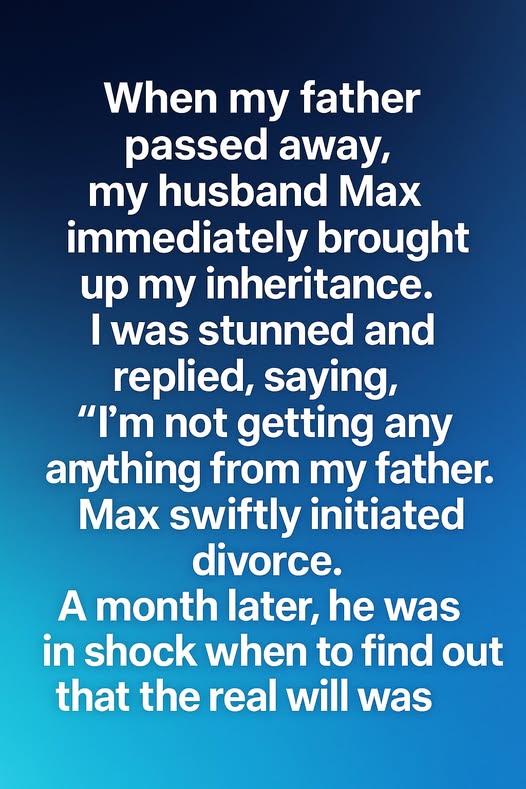Then, out of nowhere, he filed for divorce.
He didn’t ask to talk. He didn’t try to explain. He simply placed the documents on the kitchen table like he was setting down the mail. I stared at the pages, confused, numb, and embarrassed that part of me was still hoping this was some kind of mistake.
“What is this?” I asked, though the answer stared me in the face.
“It’s better this way,” he said, refusing to meet my eyes. “We’re not… compatible anymore.”
He couldn’t even give me the courtesy of an honest lie.
I wanted to scream, to demand answers, to tell him what a coward he was—but grief has a way of draining every last spark of anger. I didn’t have the strength to fight for someone who didn’t think I was worth staying for. So I signed the papers with a steady hand that didn’t match the tremors running through my body.
When he walked out of the house for the last time, he didn’t look back. I stood at the window and watched him into the driveway, wondering how long he’d been waiting for the right moment to leave me. Maybe he believed there was no better time than when I was already broken.
The following weeks were strangely quiet. I traded a husband’s empty words for the company of my father’s memory, which somehow felt kinder. I focused on putting myself back together piece by piece. I donated clothes I didn’t wear. I organized the house. I visited my mother more often. And slowly, the ache became something bearable.
Then, one afternoon, I received a call from my father’s attorney. His voice was warm and careful, as if he’d spent years delivering the kind of news that required gentleness.
“I think it’s time for us to meet,” he said. “Your father left instructions to share the contents of his will with you privately, once everything was finalized.”
I blinked. “He… had a will?”
“Yes,” the attorney replied. “A very thoughtful one.”
When I arrived at his office, he handed me a sealed envelope with my name on it in my father’s neat handwriting. Inside was a letter from Dad, written months before he passed. He explained that he hadn’t wanted anyone—including me—to face pressure or expectations while he was still alive. He wanted the will to be revealed only when everything was settled cleanly, without outside influences or manipulations.
He left me the house he’d grown up in, the savings he’d quietly accumulated despite insisting he wasn’t wealthy, and a collection of handwritten journals he’d kept throughout his life. He wrote that he wanted me to have the things he considered “roots”—pieces of him I could hold onto when the world felt uncertain.
He ended the letter with: “There is strength in you that you haven’t even met yet. Use this life well, sweetheart. Use it the way I know you can.”
I cried in that office, not because of the money or the house, but because the man who’d always loved me most had found a way to take care of me even after he was gone.
The news of the will traveled quickly—small towns have a way of spreading information without even trying. And eventually, Max heard.
He showed up at my door two days later. His expression was tight, almost panicked.
“You—you didn’t tell me there was more,” he stammered.
“There was nothing to tell.” My voice was calm in a way that startled both of us.
“Maybe we rushed into the divorce,” he said. “Maybe we should think about things—”
“Max,” I interrupted, “you divorced a grieving woman because you thought there was nothing she could give you. Now that you know I have something, suddenly you want to ‘think about things’?”
His face went pale.
“I made a mistake,” he whispered.
“You did,” I agreed. “And now you get to live with it.”
I closed the door gently. He didn’t knock again.
That day, I realized something my father had known long before I did: sincerity reveals itself when life strips everything else away. Some people love you for what you can offer them. Others love you for who you are when you have nothing left to give.
My father had been one of the latter. Max had proved himself the former.
Now, with Dad’s journals stacked on my bedside table and a new chapter opening in front of me, I’m learning to walk lighter. I’m learning to choose people who choose me for the right reasons. And I carry my father’s final gift with me—not the house, not the money, but the reminder that real love never asks, “What do you have?” It asks, “How can I stand beside you?”
And that’s the inheritance worth holding onto.

